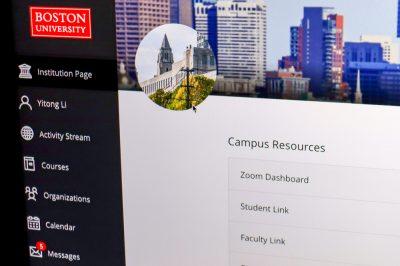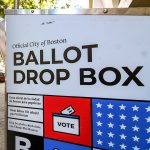Boston University students’ work is being flagged on Blackboard as “machine-generated” by Turnitin’s new artificial intelligence detection software, launched in early April.

COM CO 101 students, specifically international students, have said that their work was flagged as machine-generated despite them not using AI tools, even though the technology reports 98% confidence.
Casey Tang, a sophomore in the College of General Studies who is currently enrolled in CO 101, experienced his work being flagged as AI generated. Tang said he met with his professor about the potentially AI-generated work, who, at the end of the meeting, said he believed Tang’s work was original.
“I think that the reason why [my work] got highlighted is because of my sentence structures,” Tang said. “Maybe the way I structured the sentences sounded a bit like AI-generated content.”
Though he was not penalized for his work being flagged as AI-generated, Tang expressed frustration about receiving an email from his professor in the first place.
“I spent almost two hours working on this project, making everything sound neat [and] checking for grammatical errors,” he said. “Then I get this email saying, ‘We have detected that you used AI-generated content,’ and that just doesn’t feel good.”
Sharon Hao, a freshman in the College of Arts and Sciences, said she used a translator for an assignment that resulted in AI-usage allegations.
“International students [use]… Google Translate to double check your essay and Grammarly to make sure [the] grammar is right for the long essays,” Hao said.
Hao said international students sometimes use translating websites to receive help with language and not to “use others words or ideas.”
Hao said she showed her professor two earlier versions of her essays including the dates and times she wrote it.
Dana Janbek, a master lecturer in the Department of Mass Communication and a COM CO 101 professor, said that professors should be clearer about what technology can and cannot be used by students.
“The devil is always in the details, so I think we have to be clearer about what is permissible and what is not permissible,” Janbek said.
Janbek explained that Turnitin has always reported if a percentage of the paper matches another source, but the new AI detection works slightly differently.
“The AI-detection tool is similar, but it’s detecting something else,” Janbek said. “It’s not detecting plagiarism in the traditional sense, it’s detecting content that is likely to have been produced by a machine.”
The percentage that Turnitin reports is a percentage of plagiarized or AI-created content, Janbek said.
Janbek said that she and her fellow COM CO 101 professors have been handling these AI reports similarly to traditional plagiarism concerns by requesting to have meetings with students to talk about how they wrote their papers.
“Our hope is to understand why the paper was flagged, whether it’s for plagiarism or it’s for now AI, but again with the caveat that the AI portion is new to us,” Janbek said.
CO101 professors are “focusing on the higher percentages” of plagiarism or AI right now, but any percentage is a concern she said.
“We are expecting to grade the work that the students have produced, so if a student is running a paragraph through a translation software, and that’s what’s being submitted, then it is machine generated language,” Janbek said.
Janbek said that for upcoming projects and in the foreseeable future, COM CO 101 professors are planning on clarifying what tools students are allowed to use. Artificial intelligence, including Chat GPT, is strictly prohibited by the course’s syllabus.
BU Spokesperson Colin Riley said students only hurt themselves when they do not do their own work.
“For someone who’s done the work, I don’t think they need to fear anything,” Riley said. “I think they really need just to have a conversation with a faculty member, to show the work and to express their knowledge and understanding.”





The student admitted to using Google Translate and Grammarly. Isn’t that, by definition, machine-generated content?
Banning translation and grammar checking is dumb. These are tools we will have for the rest of my lives. If the content of the essay is my own (not ai generated) does it matter if I had to use spell check or grammarly to fix a few grammatical mistakes that don’t change the meaning or words of my essay?
One of my professors at BU highly encouraged us to use grammarly before submitting assignments because they would be grading our grammar/spelling the hardest. How are any students (but especially international students) supposed to succeed if things like grammarly and translation softwares are banned? Where are the accommodations for people who do not speak/write English as well as native speakers?